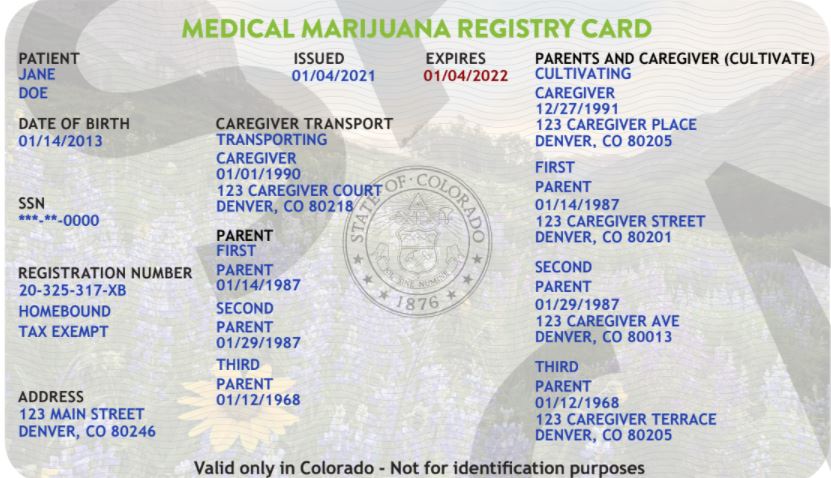5 Benefits of Getting A Medical Marijuana Card in Colorado
Colorado is the first state to approve the use of medical marijuana in 2000, and has well-established itself as the center of medical marijuana treatment advancements, innovation in how cannabis can be cultivated with the most potency, as well as the legalization and de-stigmatization of marijuana use – and maybe for that reason alone it’s well worth taking a look at whether you qualify for a a medical marijuana (MMJ) card.
There are a variety of conditions and illnesses that would qualify you for a medical marijuana card; some of the most common conditions are epilepsy, HIV/AIDS, cancer, chronic pain, and seizure disorders but there are many others, which is why if you’re considering a medical card, but you’re not sure if you qualify, it’s worth talking to a healthcare provider to find out if you do – since that’s the first step in your application process anyway. From there you complete Colorado’s registration packet and payment for the ID card itself.
In 2021, anyone 21 years or older can buy all kinds of flowers, tinctures, edibles, topicals, and pre-rolls in Colorado without an MMJ card. Someone who might otherwise qualify for a medical marijuana card, might think “What’s the point of going through the hassle of getting approved for a medical card? I can buy whatever I want wherever I want.” But, there are actually many, many benefits to getting your hands on an MMJ ID card — even in a state like Colorado, where it’s not totally necessary if you want to buy cannabis.
Today, we’re going to talk about just five of those excellent reasons to look into getting a card of your own.
1. Patients pay lower taxes on marijuana than recreational customers
Anyone who’s purchased recreational cannabis products, knows that they are subject to a hefty pile of taxes. Each state might come up with a slightly different percentage, but here in Colorado, recreational marijuana is always hit with an excise tax (placed on goods like gasoline and alcohol), sales tax and a local tax (a tax assessed by state for items that concern public services). All together, these taxes add up to a whopping 15% all together each time you visit your dispensary.
With an MMJ card, however, you pay a significantly more affordable 2.9% sales tax.
2. Patients are allowed to grow more marijuana plants than recreational growers
One way anyone 21 and older can save money on cannabis is by growing your own plants and cultivating your own flower. This is also a great way to make sure you rarely ever run out of your supply, and that your supply is right at home when you need it.
You’re even less likely to run out if you have an MMJ card, since card holders can grow up to 24 plants (subject to your local zoning laws). Growing your own plants can take some time and patience, but it can be well worth the effort, especially for card holders.
3. You’ll be able to purchase more marijuana during one transaction
Colorado’s limit for recreational marijuana customers is 1 ounce of flower at a time (or 8 grams of concentrate, 800 mg of edibles, or 8000 mg of vape cartridges). However, if you’re a medical marijuana patient, you’re able to purchase and possess twice as much flower at a time or more if you have been certified for an extended plant count (EPC).
If you have a condition that would qualify you for an MMJ card, this could be a big hurdle you have to deal with; buying a greater quantity of weed at a time could save you many trips to the dispensary over time.
4. Medical cannabis patients have access to many more dispensaries
MMJ card holders have access to recreational dispensaries, as well as dispensaries that can only be accessed by patients – and in fact these dispensaries are typically staffed with healthcare professionals, who can better tailor your product selection to your condition. You also may be able to use your MMJ card in other states with legalized medical marijuana. That kind of reciprocity just isn’t available to recreational users, and can absolutely pose a major roadblock to travel when you’re dependent on marijuana for symptom management.
5. Medical cannabis is more potent than recreational strains.
Colorado, like California, Nevada and Oregon, has a cap on the amount of cannabinoids per product: 1,000 mg of cannabinoids. As a medical marijuana card holder, however, you would have access to products with twice the amount of cannabinoids. This can ultimately make a pretty big difference in the amount of marijuana you would purchase at once, since you won’t need to use as much product at once. This alone could save you a lot of money and time in the long run.
In conclusion…
If you’re already stopping at your local recreational dispensary on a regular basis to deal with the symptoms of an illness (physical or mental), and you’ve been avoiding getting an MMJ card because you think you’re saving money and time, it’s time to reconsider. In the state that first ushered in legalized cannabis, medical and recreational alike, you’re sure to find many more benefits than these five above – but this is a good start.
Give us a call at (719) 246-0393 or email us at hello@medicalalternativesclinics.com to learn more about getting a med card.







